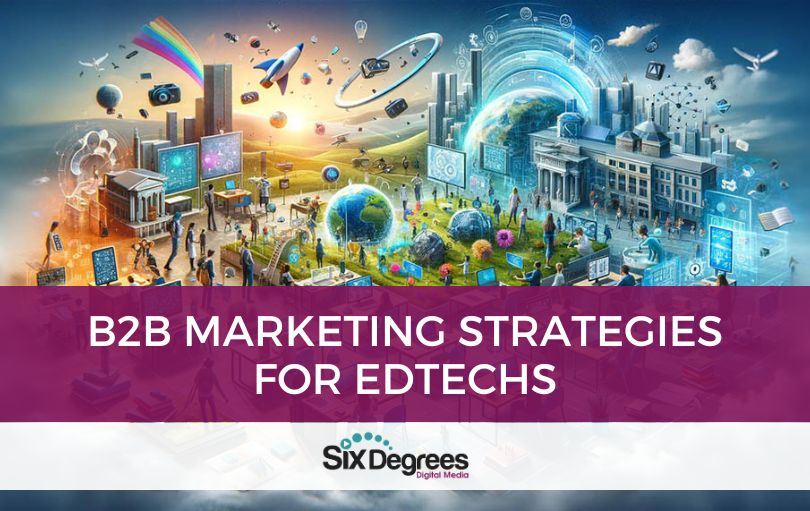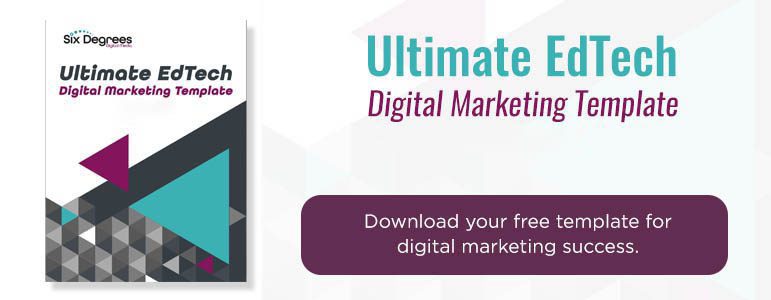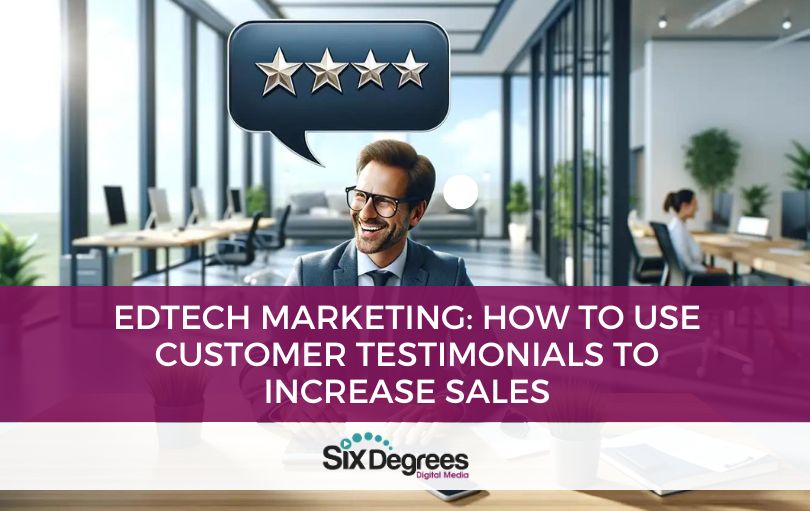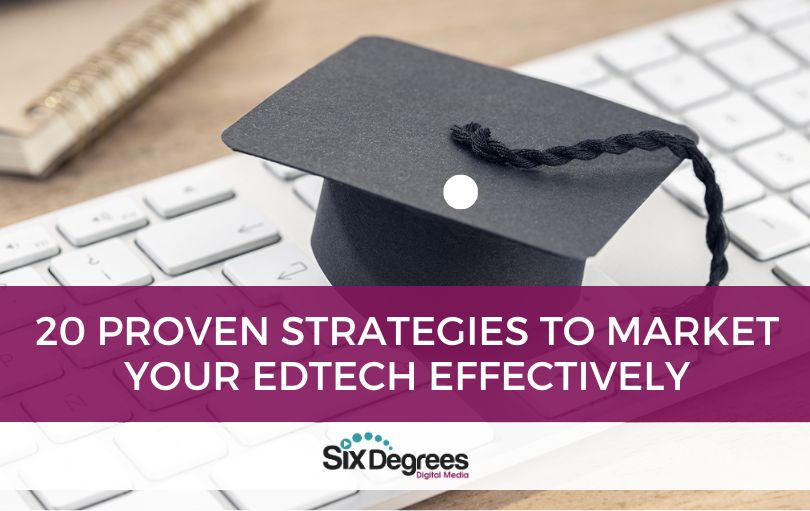EdTech startups face a myriad of challenges. From establishing a distinctive online presence to effectively engaging educators and institutions, the complexities of digital marketing in the education sector can be overwhelming. Here is a comprehensive list to get you started off on the right foot.
Building a targeted email list requires a strategic approach and a keen understanding of your ideal audience. Here’s how you can ensure your email campaigns are reaching the right individuals:
Define Your Audience: Start by clearly defining your target audience. Identify the specific roles and positions within the education sector that would benefit the most from your EdTech solutions. This could include teachers, school administrators, educational technology coordinators, or even students, depending on your offerings.
Create Buyer Personas: Develop detailed buyer personas based on demographics, job roles, challenges, and goals. Understand the pain points of your audience and how your EdTech solutions can address these challenges effectively. Personas provide a human touch to your audience, allowing you to personalize your emails accordingly.
Utilize Website Opt-Ins: On your website, implement opt-in forms strategically. Offer valuable resources such as eBooks, whitepapers, or webinars related to EdTech and request visitors to subscribe to your newsletter or updates. Ensure the content you offer aligns with the interests of education professionals.
Leverage Social Media: Engage with educators and educational institutions on social media platforms. Create valuable and shareable content that showcases your expertise and insights in the EdTech field. Encourage followers to join your email list for more exclusive content or educational resources.
Networking and Events: Attend industry events, conferences, and webinars related to education and technology. Network with educators and professionals who express interest in your solutions. After the events, follow up with personalized emails, introducing your startup and inviting them to join your email community.
Partnerships and Collaborations: Partner with educational associations, institutions, or influencers within the EdTech sector. Collaborate on joint webinars, workshops, or events. Through these partnerships, you can gain access to a broader and more targeted audience interested in educational technology.
Regularly Update and Clean Your List: Keep your email list updated and relevant. Regularly clean your list by removing inactive subscribers or those who have opted out. Quality always trumps quantity in email marketing. A smaller, engaged audience is far more valuable than a large, disinterested one.
By following these strategies, you can build a targeted email list that comprises education professionals genuinely interested in your EdTech solutions. This precision in audience selection ensures that your email campaigns are not only well-received but also lead to meaningful engagements and conversions within the education sector.
One of the key strengths of EdTech is its ability to cater to the varied needs of educators. By segmenting your email list to address these distinct requirements, you can enhance the relevance and effectiveness of your email campaigns. Here’s an example of how you can segment your email list based on the diverse needs of educators:
- Subject-Specific Educators: Some educators specialize in specific subjects, such as mathematics, science, or language arts. Tailor your emails to this segment by highlighting how your EdTech solutions can assist in teaching and learning within these subject areas. Share case studies or success stories that align with their subject-specific needs.
- K-12 Teachers vs. Higher Education Professors: K-12 teachers and higher education professors have different teaching environments and priorities. Segment your list accordingly and send content that addresses the specific challenges and goals of each group. For K-12 teachers, focus on classroom engagement and practicality, while for higher education, emphasize academic enhancement and research possibilities.
- Administrators and Decision-Makers: School administrators and decision-makers are concerned with broader aspects like budgeting, scalability, and the alignment of technology with educational goals. Craft emails that showcase the cost-effectiveness, scalability, and positive impact of your EdTech solutions on educational outcomes.
- Technology Coordinators: These professionals play a crucial role in implementing and managing technology solutions within educational institutions. Share content that emphasizes the ease of integration, technical support, and the potential for streamlining technology infrastructure with your EdTech products.
- Special Education Professionals: Special education educators have unique requirements for addressing diverse learning needs. Tailor your emails to highlight how your EdTech solutions can assist in creating inclusive and accessible learning environments.
- Student Engagement Specialists: Instructors specializing in student engagement and motivation require content that demonstrates how your EdTech tools can captivate and inspire learners. Share success stories that showcase improved student participation and motivation.
By segmenting your email list based on these criteria, you can create personalized and relevant content for each group of educators, addressing their specific needs and preferences. This approach increases the likelihood that your emails will resonate with your audience, leading to higher engagement and conversion rates within the education sector.
Personalized content adds a human touch to your emails. It’s about customizing your message to resonate with the individuals you’re addressing. By understanding their challenges and aspirations, you can craft emails that feel more relevant and relatable. This connection makes your audience more receptive to your messages, leading to higher engagement rates.
Understanding Individual Needs: Imagine you’re targeting a group of K-12 teachers. Some might struggle with engaging students in remote learning, while others might seek tools to enhance collaborative learning experiences in a physical classroom. Understanding these distinct challenges allows you to personalize your content.
Example of Personalized Content:
Subject Line: “Unlock Engaging Learning: Transform Your Virtual Classroom Today!”
Email Content: “Dear [Teacher’s Name],
We understand the challenges you face in keeping your students engaged, especially in virtual classrooms. That’s why we’ve tailored a solution just for you. Introducing our new interactive learning platform designed specifically for K-12 educators. Imagine captivated students, interactive lessons, and hassle-free assessments, all in one place.
With features like real-time quizzes, collaborative projects, and virtual study groups, you can transform your virtual classroom into an engaging learning hub. What’s more, our user-friendly interface ensures a seamless experience for both you and your students.
But don’t just take our word for it. Listen to how Ms. Johnson, a fellow K-12 teacher like yourself, transformed her online classes and saw a 30% increase in student participation within a month!
[Link to Ms. Johnson’s testimonial or case study]Ready to revolutionize your teaching experience? Click here to schedule a personalized demo just for you: [Demo Scheduling Link]
Best regards,
This personalized email addresses the teacher by name, acknowledges their specific challenges, and offers a tailored solution. By sharing a relatable success story, it adds credibility and demonstrates the effectiveness of your EdTech solution. Such personalized content resonates deeply with educators, making them more receptive to your message and significantly boosting engagement rates.
Remember, the more your content aligns with the individual needs and aspirations of your audience, the stronger the connection you’ll forge, leading to higher engagement, trust, and ultimately, conversions for your EdTech startup.
In the dynamic landscape of education technology, hosting webinars tailored to the needs of educators and institutions is a powerful tool for establishing meaningful connections and driving innovation. Let’s delve into the impactful realm of educational webinars:
Exploring the Benefits of Hosting Free Webinars:
Free webinars serve as invaluable platforms for knowledge exchange. By offering educators and institutions insightful sessions without financial constraints, you create a welcoming space for learning and collaboration. Attendees gain access to expert insights, industry trends, and innovative solutions, positioning your EdTech startup as a valuable resource in the educational community.
Providing Insights into Creating Engaging Webinar Content:
The key to a successful webinar lies in its content. Tailoring your webinar content to address specific challenges and interests of educators is essential. Engaging topics might include practical tips for online teaching, leveraging technology for student engagement, or innovative assessment methods. Incorporating interactive elements such as live polls, Q&A sessions, and real-life case studies enhances participant engagement and fosters a sense of active learning.
Discussing the Impact of Webinars in Establishing Thought Leadership and Building Relationships:
Hosting webinars elevates your EdTech startup to a position of thought leadership. By sharing expert knowledge and facilitating discussions on pertinent topics, you demonstrate your industry expertise. Educators and institutions perceive your startup as a reliable authority, increasing trust in your brand. Moreover, webinars create opportunities for direct interaction. Engaged participants often become loyal followers, leading to valuable relationships and potential partnerships.
Case in Point:
Consider hosting a webinar titled “Empowering Educators: Navigating Hybrid Learning Challenges.” In this session, expert speakers share best practices, innovative tools, and success stories related to hybrid learning environments. Engaging panel discussions, live demonstrations of your EdTech solutions, and participant-driven Q&A sessions add depth to the content.
Through this webinar, educators gain actionable insights to enhance their teaching methods, while your EdTech startup showcases its solutions in a real-world context. Post-webinar, attendees receive exclusive access to resources discussed during the session, fostering a sense of value and gratitude.
In essence, educational webinars aren’t merely virtual events; they’re bridges to knowledge, connections, and growth. By hosting engaging and insightful sessions, your EdTech startup can leave a lasting impact, positioning itself as a leader in the education technology sector while nurturing valuable relationships within the educational community.
Leveraging Workshops: A Hands-on Approach towards Relationship Building
Workshops, with their interactive and immersive nature, offer a unique avenue for EdTech startups to forge lasting connections and provide genuine value to potential clients. Here’s why workshops are invaluable and how you can maximize their impact:
The Interactive Nature of Workshops: Engaging Potential Clients in Real Time
Workshops stand out due to their hands-on, participatory format. Unlike traditional lectures or presentations, workshops invite active engagement. Educators and institutions can directly experience your EdTech solutions, allowing them to grasp the practical benefits firsthand. This interactive approach fosters deeper understanding, encourages questions, and builds immediate connections. Attendees become collaborators in the learning process, making workshops a powerful tool for engaging potential clients on a personal level.
- Define Clear Objectives: Determine the specific learning outcomes you want to achieve. Whether it’s showcasing a new feature or demonstrating effective teaching strategies, having clear goals ensures your workshop remains focused and impactful.
- Interactive Activities: Incorporate group activities, discussions, and live demonstrations. Encourage participants to interact with your EdTech tools in real-time. Hands-on experience not only enhances learning but also builds confidence in your solutions.
- Expert Facilitation: Have knowledgeable facilitators who can guide participants effectively. These facilitators should not only understand your products but also be skilled in engaging diverse audiences. Their expertise ensures a seamless and enriching workshop experience.
- Customization: Tailor your workshop content to the specific needs of your audience. Address challenges educators face in their day-to-day activities and demonstrate how your EdTech solutions provide practical solutions. Customization adds relevance and value.
Hosting a variety of workshops can cater to different needs and interests within the educational community. Here’s a list of potential workshops an EdTech company can host to engage educators and institutions effectively:
- Interactive Learning Platforms Workshop: Explore the features and benefits of your interactive learning platform, showcasing real-time collaboration, assessments, and student engagement tools.
- Effective Online Teaching Strategies: Provide practical tips and techniques for educators transitioning to online teaching, including best practices for virtual classrooms and student interaction.
- Gamification in Education Workshop: Explore the integration of gamified elements into the curriculum, demonstrating how gaming principles can enhance student motivation and learning outcomes.
- Digital Literacy and Online Safety: Educate teachers, students, and parents about digital literacy, online safety, cybersecurity, and responsible internet use in the classroom and at home.
- Augmented Reality (AR) and Virtual Reality (VR) in Education: Showcase how AR and VR technologies can create immersive learning experiences, allowing participants to experience virtual classrooms and simulations.
- STEM Education with EdTech Tools: Explore how EdTech tools can enhance Science, Technology, Engineering, and Mathematics (STEM) education, encouraging hands-on learning and problem-solving.
- Special Education Technology Workshop: Focus on assistive technologies and EdTech solutions tailored for students with diverse learning needs, addressing inclusivity and accessibility in the classroom.
- Flipped Classroom Strategies: Guide educators on flipping their classrooms, emphasizing pre-recorded lessons, interactive assignments, and in-class activities facilitated through EdTech tools.
- Project-Based Learning with Technology: Demonstrate how EdTech platforms support project-based learning initiatives, fostering creativity, collaboration, and critical thinking skills among students.
- Parent Engagement and Communication: Educate parents on EdTech tools used in classrooms, enabling effective communication with teachers, monitoring student progress, and engaging in their child’s learning journey.
- Data Analytics and Student Progress: Showcase how data analytics tools integrated into EdTech platforms can help educators track student progress, identify learning gaps, and personalize teaching approaches.
- Professional Development for Educators: Provide training workshops for teachers on using EdTech tools effectively, incorporating them into lesson plans, and staying updated with the latest trends in educational technology.
- Teacher Collaboration Platforms: Explore collaborative tools designed for educators, emphasizing their role in fostering teamwork, resource sharing, and professional growth among teachers.
- Language Learning with Technology: Introduce language teachers to language learning apps, interactive platforms, and online resources that enhance language acquisition through engaging activities.
- Global Classroom Connections: Facilitate workshops on connecting classrooms globally, leveraging EdTech tools for international collaboration, cultural exchange, and joint projects.
By offering a diverse range of workshops, your EdTech company can cater to various educational needs, ensuring engagement and providing valuable insights into the potential of your products and services.
In conclusion, workshops offer a powerful means of engagement for EdTech startups. By focusing on interactivity, practical learning, and customization, you can create enriching experiences that not only educate but also establish strong, meaningful relationships with potential clients. Sharing success stories amplifies the impact, showcasing the tangible benefits of your solutions and solidifying your position as a trusted partner in the educational journey.
In the realm of educational technology, forging strategic partnerships with education associations and institutions is a pivotal step for EdTech companies. These collaborations offer a myriad of benefits, facilitating a symbiotic relationship between technology providers and the educational community. Here’s a closer look at the advantages and strategies for successful partnerships:
Exploring the Benefits of Partnering with Education Associations and Institutions:
- Credibility and Trust: Partnering with reputable education associations enhances your company’s credibility. It signifies your commitment to quality education and innovation, instilling trust among educators, institutions, and parents.
- Access to a Targeted Audience: Associations have established networks of educators, administrators, and policymakers. Partnering allows you direct access to your target audience, enabling you to showcase your solutions to those who are genuinely interested and influential in the decision-making process.
- Validation of Solutions: Endorsement from respected education associations validates the effectiveness of your products or services. Such validation can significantly impact the perceptions of potential clients, encouraging them to explore and adopt your EdTech solutions.
Insights on Finding Suitable Partnerships within the Educational Community:
- Research and Alignment: Research education associations that align with your company’s mission and goals. Consider their focus areas, initiatives, and events. An aligned partnership ensures mutual enthusiasm and a shared vision, laying the foundation for a fruitful collaboration.
- Attend Industry Events: Actively participate in education conferences, seminars, and workshops. These events provide opportunities to connect with association representatives, allowing you to gauge their interests and explore potential partnerships in person.
- Engage in Conversations: Engage in online forums, social media groups, and webinars related to education. Participating in discussions within the educational community helps you identify associations that are influential and well-regarded by educators.
Nurturing Collaborative Relationships for Mutual Benefit and Credibility:
- Open Communication: Foster open lines of communication with your partners. Regular updates, sharing insights, and seeking feedback demonstrate your commitment to the partnership. Transparency builds trust and strengthens the relationship over time.
- Collaborative Initiatives: Collaborate on joint initiatives such as webinars, workshops, or research projects. These shared efforts not only enhance your credibility but also provide valuable resources and insights to the educational community.
- Recognition and Appreciation: Acknowledge your partners’ contributions publicly. Recognize their efforts in your marketing materials, websites, or social media platforms. Appreciation strengthens the relationship and encourages ongoing collaboration.
In summary, strategic partnerships with education associations and institutions are invaluable assets for EdTech companies. By understanding the mutual benefits, conducting thorough research, and nurturing collaborative relationships, your company can create impactful alliances that elevate your credibility, extend your reach, and contribute significantly to the educational ecosystem.
At Six Degrees Digital Media, we’re passionate about helping EdTech startups like yours thrive in the competitive digital landscape. Our tailored marketing solutions are designed to elevate your brand, engage your audience, and drive meaningful results. If you’re ready to take your marketing efforts to the next level and explore strategies crafted specifically for your EdTech venture, we invite you to schedule a free strategy session with our expert team.
During this session, we’ll delve deep into your unique challenges, aspirations, and goals. Together, we’ll uncover innovative marketing approaches, identify opportunities for growth, and outline a customized roadmap tailored to your needs. Whether you’re looking to enhance your online presence, engage educators effectively, or establish thought leadership in the EdTech sector, our experienced professionals are here to guide you every step of the way.
To schedule your complimentary strategy session, simply click here.
















